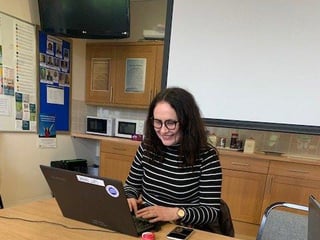University of Portsmouth expert gives ten top tips to help children deal with coronavirus concerns and social isolation
and live on Freeview channel 276
Dr Emma Maynard, who is a senior lecturer in education at the University of Portsmouth, has said the current situation is a ‘game changer for families’ and that children ‘can’t be ‘protected in a bubble of normality’.
Dr Maynard said: ‘We can’t protect children too much as they need to understand and act upon the seriousness of the situation. The stakes are too high and we need children to understand key messages.’


Advertisement
Hide AdAdvertisement
Hide AdAs a child psychologist, Dr Maynard feels the sudden changes to the world as children know it could potentially have a profound impact on their mental state.
‘To help them through what could be months of isolation and lockdown, we need to consider how this new world looks and feels to them,’ she said.
‘Younger children can’t understand why their lives have changed so dramatically. Some older children may understand too well and be anxious about the stories they hear.
‘Lots of these children will struggle with the idea of social isolation – as would anyone - and why they can no longer see their friends. Many teenagers are already stressed with the uncertainty of not being able to sit their GCSE and A-level exams,’ added Dr Maynard.
Advertisement
Hide AdAdvertisement
Hide AdWith changes and uncertainty leading to heightened anxiety for children and potential conflict with parents, Dr Maynard has been offering her ten top tips to deal with children’s concerns and the difficulties of self-isolation.
1 Physical contact for younger children
‘People that can hug children should be giving lots of physical contact at this time. Children are often soothed by touch which calms the heart rate and allows them to feel secure.
2 Transitional objects
‘Rules should be relaxed on transitional objects such as teddies and dummies. These are items which can help younger children feel secure.’
3 Hugging jar
‘Where hugging is not not possible due to social distancing, you can treasure children’s need for physical contact by taking their requests for hugs sincerely and banking them in a special jar with homemade hug tokens. You can tell the child these will be cashed in when everything returns to normal.’
4 Provide honest but reassuring answers
Advertisement
Hide AdAdvertisement
Hide Ad‘Once children are old enough to start asking questions you should answer in an honest but reassuring way. For example, you can tell them some people have died, but not children, and washing our hands and staying at home is helping all of us stay safe.’
5 Focus on positivity
‘Where possible, divert children’s attention to any good things coming from the crisis such as the feeling of community spirit and how we can help elderly neighbours.’
6 Provide structure
‘Through school, children generally have quite a lot of structure in their lives. Children need routine and it’s important to maintain some of this. Plan out activities at the start of each week and keep a schedule of daily activities, including reading and maths sessions. However, have a loose timetable which isn’t too rigid.’
7 Children’s time frame
‘Children’s sense of time can be quite different from adults, with hours and days feeling much longer. If in isolation, keep a tally on when you may be able to come out and let them tick off the days on a chart.’
8 Washing hands games
Advertisement
Hide AdAdvertisement
Hide Ad‘Turn hand washing into soapy hand monsters and soapy hand washing races. Get soaps in different colours and smells and invite children to play with it in the sink. Play music to cover the recommended 20 second wash time.
9 Keep news access in balance
‘Once older children have computers and phones they have access to constant news. Be aware of horror stories circulating on social media and try to diffuse them – they are not helping anyone’s mental health. Be willing to turn off access where necessary.’
10 Think carefully about computer games and movies
‘At this time avoid letting older children access to movies and games which are too close to home with the current pandemic.’
Comment Guidelines
National World encourages reader discussion on our stories. User feedback, insights and back-and-forth exchanges add a rich layer of context to reporting. Please review our Community Guidelines before commenting.
